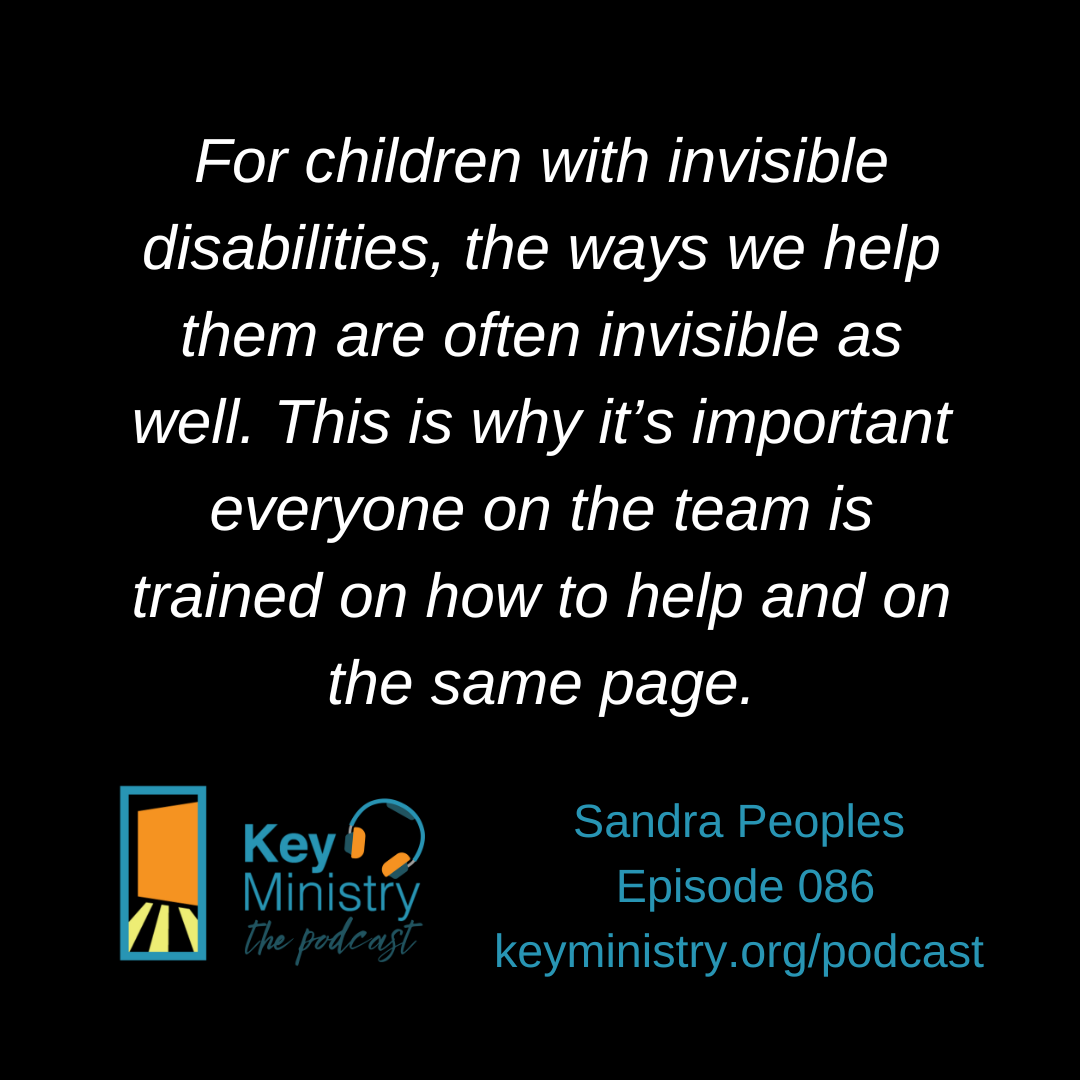In this week’s episode of Key Ministry The Podcast, Sandra Peoples discusses hidden disabilities, and how we, as The Church, can better support these students with invisible disabilities.
Listen Anywhere You Find Podcasts!
Hi friends! I’m Sandra Peoples, and today we’re talking about supporting students with invisible disabilities. These are often the kids in our regular kid min classrooms and activities who need a little extra help to be successful. Key Ministry’s founder and president, Steve Grcevich is of course THE expert in this area, and I’m relying on what I’ve learned from him in presentations and in his book Mental Health and the Church: A Ministry Handbook for Including Children and Adults with ADHD, Anxiety, Mood Disorders, and Other Common Mental Health Conditions to help me help you!
Before we jump into the content, I want to make sure you know about the early bird ticket price for Disability and the Church. If you register by Feb. 29th to join us May 1-3 in Orlando for the Disability and the Church conference, you will get the lowest price available. Visit https://www.keyministry.org/datc2024 for the details.
Ok, let’s jump into our topic today!
First, What are invisible disabilities?
Invisible or hidden disabilities include:
Emotional
Behavioral
Developmental
Disorders/diagnoses with no apparent physical symptoms or characteristics.
Includes students with ...
Attention-deficit/hyperactivity disorder (ADHD)
Anxiety disorders
Autism spectrum disorder, level 1
Other mental health conditions like OCD
Learning disabilities
Oppositional defiant disorder
PDD NOS
Mood disorders (depression, bipolar)
Attachment disorders (common in adopted and foster care children)
Fetal alcohol effects
Brain injuries
What we know about families that are affected …
They don’t always consider their kids to have disabilities or special needs
There is often a genetic component
They consistently hear more bad news than good news
They feel discouraged and isolated
They are less likely to attend church than a typical family and are more likely to have had negative past experiences
The good news!
These students can often be successful with a few changes
Serving the students well can make huge, positive changes for the entire family
The mission field of families is ripe and ready for the hope of the gospel
Goal for the students: Have the opportunity to hear and respond to the gospel in a way they understand and in an environment where they feel comfortable.
Goal for their families: To be included in all aspects of church life, knowing their child is safe and loved.
We can break down barriers that keep them from church.
Matthew 21:14, “And the blind and the lame came to him in the temple …”
For children with invisible disabilities, the ways we help them are often invisible as well. This is why it’s important everyone on the team is trained on how to help and on the same page.
What challenges keep children and teens with ADHD from being successful at church?
Struggle with self-regulation and impulse control (throwing, hitting, talking out)
Sensory processing challenges
Executive function deficits (following multiple directions)
Immature social skills
Verbal and non verbal working memory deficits (remembering their Bible when they leave)
Less structured environment at church
Some kids who take meds don’t take them on the weekends
How we can help
Clear expectations
Structured environments
Classrooms that are engaging but not overwhelming
Provide fidgets (especially when waiting for his/her turn)
Ask him/her to be a helper (opportunity for movement)
Support when transitioning from preferred to non preferred activity
What challenges keep children and teens with anxiety from being successful at church?
Fear of unknown (routines, environments, adults)
Overthinking to the point of inaction (“What should I play with?”)
Drive for perfectionism (“I have to get this right!”)
How we can help
Social stories and welcome videos on the website
Visual schedule
Visual timer
Positive encouragement
Fewer choices to make decisions easier
What challenges keep children and teens with autism level 1 from being successful at church?
Sensory seeking or avoiding tendencies
Social interactions feel challenging
Rigid behaviors, inflexibility
Can lack empathy or be overwhelmed by the emotions of others
Prefer concrete language, which isn’t always used at church (“Ask Jesus into your heart ...”)
Have specific areas of interests
OCD-like behaviors
How we can help
Clear expectations
Visual schedule
Provide a buddy to help navigate social interactions
A sensory space for breaks
Fidgets
Noise reducing headphones
Comfortable seating with boundaries
Support when transitioning from preferred to non preferred activity
Re-story Children’s Experiences
Focus on barriers that can be adjusted instead of deficits and problem behaviors
Remember the child’s good design (he calls out vs. he’s eager to share his thoughts)
Understand that every child (and family) needs the opportunity to hear & respond to the gospel
Friends, we got through a lot of info together today! I hope it was helpful. You can find an outline at keyministry.org/podcast if you missed anything or want to reference it in the future. Before you move on with your day, it would be helpful if you left a rating or review in the podcast app you’re using. It helps other ministry leaders find us and know that we might be a good resource for them as well! Have a great rest of your week and remember to register for DATC this month to get the early bird ticket price! We can’t wait to see you there in person!





